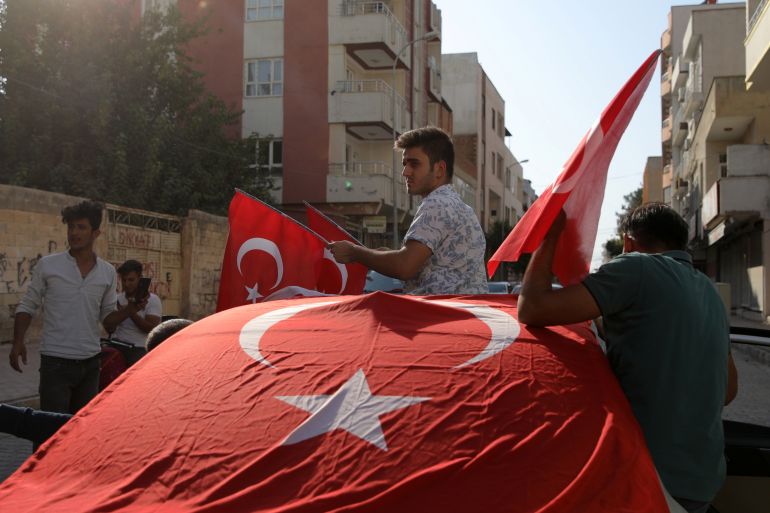Turkey’s opposition claim ballot irregularities in Sunday’s polls
The CHP and YSP have voiced concerns and lodged complaints since Sunday about the discrepancies between the recorded count made at polling stations and the votes entered into the Supreme Election Council’s system.

Istanbul, Turkey – Opposition parties in Turkey have reported thousands of discrepancies and ballot irregularities in the presidential and parliamentary elections, casting a shadow over the polls that took place on Sunday.
The Cumhuriyet Halk (Republican People’s Party, CHP) and the Yeşil Sol Party (Green Left Party, YSP) have voiced concerns and lodged complaints since Sunday about the discrepancies between recorded count made at polling stations and the votes entered into the Supreme Election Council’s (YSK) system.
Keep reading
list of 4 itemsAs Turkey heads to a presidential election run-off, what’s next?
Turkey slams election observers’ ‘lack of transparency’ comment
Kilicdaroglu turns to anti-migrant fears before Turkey run-off
On Wednesday, Muharrem Erkek, CHP’s deputy chair, said irregularities were found by the party in 7,094 ballot boxes after it checked more than 201,000 from within Turkey and abroad.
Some 4,825 of the CHP’s objections were over parliamentary votes and 2,269 in the presidential election.
Complaints over election irregularities are a common event during Turkish elections, and observers have pointed out that many of the discrepancies during Sunday’s vote may have been the result of errors in the CHP’s own system, rather than the YSK’s.
Turkey’s presidential election will head to a run-off on May 28 after neither the incumbent Recep Tayyip Erdogan, nor CHP leader Kemal Kilicdaroglu managed to win an outright 50 percent majority on Sunday.
Erdogan led the polls with 49.5 percent of the vote with Kilicdaroglu bagging 44.89 percent.
Erkek said votes for Kilicdaroglu had been incorrectly allocated to Muharrem Ince who pulled out of the presidential race three days before the election, not allowing enough time to print new ballot papers without his name.
Speaking to journalists in Ankara on Wednesday, Erkek said extra votes were also given to Erdogan, without giving any evidence.
“We are following every single vote, even if it does not change the overall results,” Erkek said.
In the parliamentary polls, Erdogan’s Adalet ve Kalkınma Party (Justice and Development Party, AK Party) took the most ballots.
The Milliyetçi Hareket Party (Nationalist Movement Party, MHP), AK Party’s alliance party, outperformed expectations with more than 10 percent of the vote share.
The YSP, which fielded parliamentary candidates from the pro-Kurdish Halkların Demokratik Party (Peoples’ Democratic Party, HDP) due to a legal closure threat against the latter, said it had discovered more than 1,000 cases of incorrect entries.
“We have no evidence to say if there is an organised malignancy behind these mistakes and errors or whether someone is deliberately trying to influence these outcomes,” YSP’s election spokesperson Mehmet Rustu Tiryaki said on Tuesday.
The party backed Kilicdaroglu, who leads a six-party alliance, for the presidency.
Voting irregularities
On Monday, the AK Party pushed back against the CHP’s claims, with party spokesman Omer Celik accusing the opposition of pushing “false statements” and “false data”.
“As of yesterday [Sunday], everything they said was wrong,” Celik said. “As of yesterday, their approach of imposing their own data unilaterally by attacking others and presenting their own data as an absolute truth that everyone should accept has collapsed, but today they continue to act as if nothing has happened as usual.”
The election authority is due to publish its data on Friday. However, it has shared information on the votes with political parties.
The CHP told voters to check data published on YSK’s website against freely available polling station records. That led to people posting discrepancies on social media, including instances in Turkey’s Kurdish-majority southeast where HDP/YSP votes seemed to have been transferred to the MHP.
Although election campaigns in Turkey have been criticised for allowing the governing party an unfair advantage over its use of state resources, control of media and legal intimidation of opponents, the actual vote itself had been thought to be largely secure.
YSK President Ahmet Yener, however, condemned the claims made online as “unfounded” and “intended to mislead the public”, adding that the organisation’s system was “transparent”.
Roman Udot, co-chair of Golos, a Russian election data monitoring watchdog now based in Lithuania, said a study of YSK’s data of previous Turkish elections revealed “very strange things”.
“We found 3,500 polling stations where the turnout was more than 100 percent, over 800 percent in one case, which is mathematically impossible,” he told a news conference in Istanbul on Wednesday.
He added that data from the 2018 polls showed the number of registered voters in Ankara being 3 percent lower for the presidential race than the parliamentary vote.
On Tuesday night, a group of people holding a “democracy watch” outside the YSK’s Ankara offices were detained by police.
“It is obvious that the YSK is clearly unlawful and is trying to usurp the will of the people,” Ilay Eroglu, a protester, told local media.
“We will protect our votes and our will and we will not be a victim of the same unlawfulness once again.”